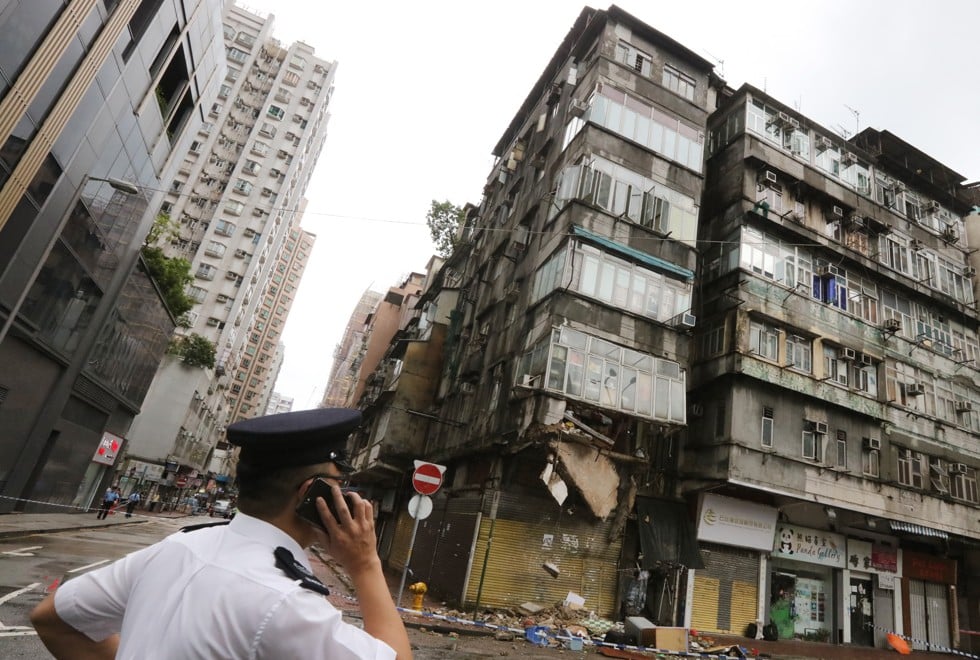
Another balcony to be demolished after collapse at old Hong Kong tenement block
Lucky escape for tenants as enclosed structure crashes down in Hung Hom during rainstorm
Two unsupported balconies are scheduled to be propped up at a 61-year-old subdivided Hung Hom tenement block for urgent safety reasons after another collapsed during heavy rain early on Wednesday.
Residents of the six-storey building – once classified a dangerous building and now slated for redevelopment – miraculously escaped injury and were given temporary housing.
The incident raised concerns over the safety of ageing walk-ups, many of which are decaying. One surveyor called for heavier penalties for owners who fail to obtain approval for building works.
Firefighters were called to the building on Gillies Avenue South just after 2am during an amber rainstorm. Residents nearby reported hearing a loud cracking sound coming from the building.
Part of the enclosed balcony floor and wall of the second-floor flat crashed to the ground, exposing the interior of a subdivided unit. Furniture and other items were thrown onto the street, while a bunk bed dangled precariously from the edge.
Twenty-two residents were evacuated, including six Polytechnic University students and the seven-year tenant of the affected flat. Chan Wing-yam, 65, was sleeping on a bunk bed at the time.
“Everything was fine all these years … There were no signs that the building was unsafe,” said the retiree, who rented one of the five subdivided rooms for HK$3,000 a month, sharing the kitchen and toilet with four other occupants.
Buildings Department senior building surveyor Ronnie Wong Kwok-ping said the collapse could have been the result of rain, rusting of concrete-reinforcing steel bars and a general lack of repair over the years, but the block itself was not in any immediate danger of collapse.
“We believe the danger is limited to a specific area only, which includes the balcony and part of the walls on the floor above that have been pulled down,” Wong said. The department is investigating the cause of the collapse.
The building is one of dozens in the area acquired by Henderson Land for redevelopment projects.
The residents were relocated to a community centre temporarily as department officials checked the building’s structural safety.
Developer Richfield Realty, a company closely linked to Henderson and claiming to represent it, said the incident was “unfortunate”. It said it was trying to arrange rehousing for residents in its empty flats nearby.
The damaged balcony was removed on Wednesday afternoon. The department said those on the third and fourth floors – also found to be structurally unsafe – will be propped up with steel girders.
According to records, the owners were issued with at least two works orders, including one in 2009 declaring the building to be dangerous and ordering them to remove “loose, cracked and otherwise defective” concrete, “clean exposed steel bars of loose rust and foreign matters” and fix additional ones if necessary.
The owners failed to comply and the department had to carry out the works and recover costs from them. The work was completed in 2011.
If you add the extra loading of windows, concrete, subdivisions and furniture, it becomes a real danger
The department received a report about neglect last month. Officials found the building to be safe but issued a warning to the owners to carry out necessary work to prevent further deterioration.
Andrew Kung Sui-lun of the Institute of Surveyors’ said it had long been common for tenement block owners to close off cantilevered balconies to maximise the internal floor area.
Such work would require raising the enclosed balcony with a layer of concrete and adding windows and parapets. While such work should be submitted for approval by the department, many were not and the department lacked manpower to ensure citywide compliance, Kung said.
“Cantilevered balconies are high risk. If you add the extra loading of windows, concrete, subdivisions and furniture, it becomes a real danger,” he said.
He said ignored problems like cracks in concrete meant rain could seep through and cause steel bars to corrode faster.
“Penalties should be raised to a level in which landlords feel it is simpler and cheaper to just remove the balcony than risk a fine or worse, causing loss of life.”
Additional reporting by Elizabeth Cheung



